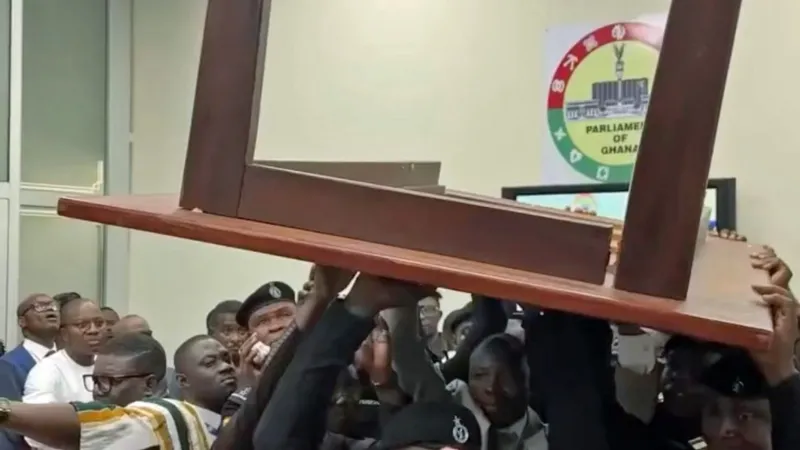Chaos in Ghana’s Parliament: MPs Clash, destroy furniture in heated debate

Ghana’s Parliament turned into a battleground once again as Members of Parliament (MPs) engaged in a physical altercation, leading to the destruction of furniture and disruption of proceedings.
The latest clash, during a heated debate, underscores the deepening political tensions in the country’s legislature.
So is politics in Africa all about winning arguments and winning elections as opposed to solving pressing issues?
Let's take a look at what transpires in Ghana's parliament.
Read more: What Is Trending In Ghana
What led to the clash?
Reports indicate that the confrontation erupted over a contentious policy decision, with lawmakers from opposing sides refusing to back down.
Voices were raised, tempers flared, and before long, elected officials were shoving, pushing, and throwing objects at each other.
Tables and chairs were overturned as security personnel struggled to restore order.
A pattern of parliamentary chaos
This isn’t the first time Ghana’s Parliament has descended into chaos. In recent years, similar clashes have occurred during debates on issues like government funding, bylaws, and the federal budget.
Political news today highlights how these disruptions often overshadow public service in Ghana.
These incidents have raised concerns about the conduct of lawmakers and the impact such behavior has on the country’s democratic image.
Public outrage and reactions
Many Ghanaians have expressed frustration over the continuous brawls in Parliament, questioning whether their elected representatives are prioritizing national interest or personal and partisan agendas.
Social media platforms have been flooded with reactions, with some calling for disciplinary actions against the MPs involved.
Calls to petition Parliament for stronger decorum measures have been gaining traction among political consulting firms and civil society groups.
What happens next?
Early morning next day, the tables and electronics were fix to continue the vetting process. But there is a need for accountability and reforms in the conduct of MPs.
Will there be consequences for those involved in the latest chaos?
Or will this simply be another episode in Ghana’s long history of parliamentary fights?
Previous instances of clashes in Ghana's Parliament
This incident is not an isolated one in Ghana's political landscape. In recent years, the legislative chamber has witnessed several episodes of unrest.
Notably, in December 2021, a brawl erupted during a debate over government money allocated for the Department of Finance.
Such occurrences have raised concerns about the decorum and conduct expected of those serving in public service roles.
Parliamentary clashes in other countries
Ghana is not alone in experiencing parliamentary discord. Across world politics, legislative assemblies have occasionally been arenas of physical confrontations:
South Africa:
In May 2016, members of the Economic Freedom Fighters (EFF) clashed with security personnel after attempting to prevent President Jacob Zuma from addressing Parliament.
The confrontation led to a brawl, highlighting deep political issues within the assembly.
Senegal:
In December 2022, a session of Senegal's National Assembly turned violent when a pregnant lawmaker was assaulted by two colleagues during a heated debate.
The incident led to legal action against the perpetrators and ignited discussions about parliamentary immunity and conduct.
Pan-African Parliament:
In June 2021, sessions of the Pan-African Parliament were disrupted by physical altercations among members, stemming from disagreements over leadership positions and rotational presidency. The chaos drew widespread condemnation and calls for reform within the institution.
These incidents underscore the challenges many constitutional republics face in maintaining decorum amidst intense political disagreements. They also highlight the need for robust mechanisms to manage conflicts and uphold the integrity of legislative processes.
The role of local MPs in maintaining order
Local MPs are expected to be representatives of the people, ensuring that government services are run efficiently.
However, political marketing tactics often overshadow the true responsibilities of a politician.
Some lawmakers use political t-shirts, campaign slogans, and flashy rhetoric rather than focusing on real legislative progress.
Political contributions and accountability
Political contributions play a significant role in influencing decision-making within Ghana’s Parliament. Accusations of corruption and favoritism are common and calls for stricter regulations on political party financing have intensified. Some experts have cited the Citizens United decision as an example of how unchecked political donations can erode democratic integrity.
A look at the Department of Justice and Political Reforms
The Department of Justice has been urged to investigate cases where parliamentary brawls lead to criminal offenses.
Government news updates frequently report on efforts to introduce stronger bylaws that penalize lawmakers who engage in violent conduct.
Some lawmakers argue that disciplinary measures should be enforced consistently, regardless of party affiliations.
Conclusion: The future of Ghana’s politics
As Ghana reflects on the recent turmoil within its legislative body, there is a pressing need for introspection and a recommitment to the principles of democracy and respectful discourse. The nation's parliamentarians must lead by example, demonstrating that even in disagreement, unity and progress can prevail.
The question remains: Will Ghana’s lawmakers finally uphold the standards of good governance, or will political chaos continue to define its Parliament?
What are your thoughts on this?
Should MPs who engage in physical altercations face legal consequences?
Let us know in the comments!
